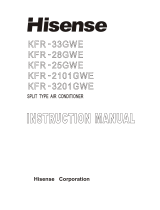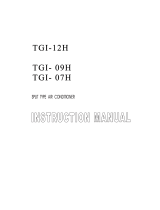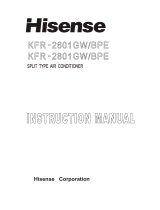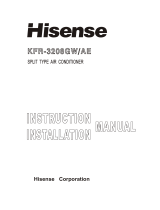
Troubleshooting
If your air conditioner does not work properly, first check the following points before requesting service. If it still
does not work properly, contact your dealer or a service center.
Tips for Energy Saving
Avoid • Do not block the air intake and outlet of the unit. If either is
obstructed, the unit will not work well, and may be damaged.
• Do not let direct sunlight into the room. Use sunshades, blinds or curtains.
If the walls and ceiling of the room are warmed by the sun, it will take
longer to cool the room.
Do • Always try to keep the air filter clean. (Refer to “Care and Cleaning.”)
A clogged filter will impair the performance of the unit.
• To prevent conditioned air from escaping, keep windows, doors and any
other openings closed.
Should the power fail while the unit is running
If the power supply for this unit is temporarily interrupted the unit will
automatically resume operation (once the power is restored) with the
same settings that were in effect before the power was interrupted.
Trouble Possible Cause Remedy
Air conditioner does not 1. Power failure 1. Restore power.
run at all.
2. Leakage circuit breaker has tripped. 2. Contact service center.
3. Line voltage is too low. 3. Consult your electrician or dealer.
4. Operation button is turned off. 4. Press the button again.
5. The remote control unit or heat 5. Consult your dealer.
pump is malfunctioning.
(ERROR and characters such as
E, F, H, L, P, etc., appear on the
display.)
Compressor runs but 1. Obstruction in front of condenser coil 1. Remove obstruction.
soon stops.
Poor cooling (or heating) 1. Dirty or clogged air filter 1. Clean the air filter to improve the
performance airflow.
2. Heat source or many people in room 2. Eliminate heat source if possible.
3. Doors and/or windows are open. 3. Shut them to keep the heat (or cold)
out.
4. Obstacle near air intake or air 4. Remove it to ensure good airflow.
discharge port
5. Thermostat is set too high for cooling 5. Set the temperature lower (or higher).
(or too low for heating).
6. (Outdoor temperature is too low). 6. (Try to use a back-up heater.)
7. (Defrosting system does not work.) 7. (Consult your dealer.)
“CHECK” is displayed. 1. Trouble in the system 1. Contact service center.
*Concealed duct type (U):
An air filter is not provided with this air conditioner at the time of shipment. To
get clean air and to extend the service life of the air conditioner, an air filter
must be installed in the air intake. For installation and cleaning the air filter,
consult your dealer or service center.
The frequency with which the filter should be cleaned depends on the
environment in which the unit is used.
How to clean the filter
1. Remove the air filter from the air intake grille.
2. Use a vacuum cleaner to remove light dust. If there is sticky dust on the
filter, wash the filter in lukewarm, soapy water, rinse it in clean water, and
dry it.
NOTE
NOTE
























